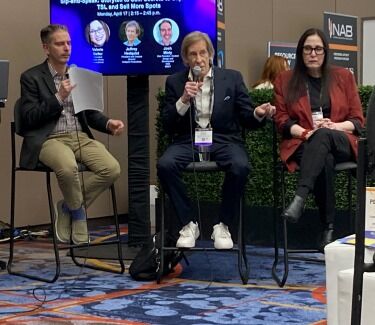How To Use Storytelling to Create Impactful Commercials.

The art of storytelling is one of the original forms of communication, relaying vital information and history long before man put pencil to paper. That art form continues today in the 21st century and can be a valuable and powerful tool for marketers.
“What we learned about life came from stories sitting around the campfire,” Jeffrey Hedquist, President & Creative Director, Hedquist Productions explained to attendees at a Sip-and-Speak session at the recent NAB Show in Las Vegas. “So, our DNA is built for those stories… If you want to reach somebody [in a commercial spot], tell the story. Because facts then become sticky and they remember. If you’re not doing that, you’re wasting your time.”
The session, “Storytell to Sell! Secrets to Skyrocket TSL and Sell More Spots,” was moderated by Josh Miely, Director, Member Experience, National Association of Broadcasters, and was recorded for “The NAB Podcast,” which he hosts and is approaching its 200th episode.
“Today we are going to be talking particularly about storytelling on the radio,” Miely explained to attendees.
During the fast-paced half-hour session, Valerie Geller, President of Geller Media International, said, “The minute a human being says ‘what happens next’ … you own them as a listener or as a member of the audience… stories are the crack cocaine of human interaction.”
Translating storytelling to the audio industry can be done with testimonials and by using the audience itself. “You'll find that customers of companies will say things that no copywriter could write,” Hedquist explained. “It has so much more credibility, people want to hear from their peers, they want to hear from their tribe… we used to say that radio is not theater of the mind, radio is theater of the gut. It presents a visual response.”
Geller believes it’s about “creating content that people want to listen to.” She continued, “The trick of the game is to make it feel like [the audience] is hearing it from a friend.”
Hedquist believes a way to become a great writer, specifically for radio is by doing improv, where you learn to “yes, and.” This comes in handy when a client presents you with a challenge. “They’re trying to sell a prostate center, but they want to do it with a jingle… So, what you do is say yes… and then your mind will come up with ideas.”
Storytelling is not only relegated to just commercial messages. It also comes into play for radio sellers who are meeting with clients.
“The most important question that you can ask a client is, ‘What is the emotional problem, this product or service solves?’” Hedquist advises.
Geller added, “Sometimes if you can show a client some of the downsides, it can be really helpful.” Be honest and truthful, she advised. “That's the core of real communication. Listeners, and clients, don’t respond to fake.” Hedquist agreed, adding, “People want to hear something that's real. And it doesn't have to be perfect.” The key, he says, is “authenticity and believability.”
In closing, Hedquist implored to “learn how to tell stories… ask the unusual questions.”
“For me, the most important thing to impart is when you are working to engage audiences, whether they're people who are going to give you money to buy commercials, or whether it's just the audience that we're making a bid for their time and attention through the content that we are providing, is what’s in it for them,” Geller said. – Jay Gleason

No comments:
Post a Comment